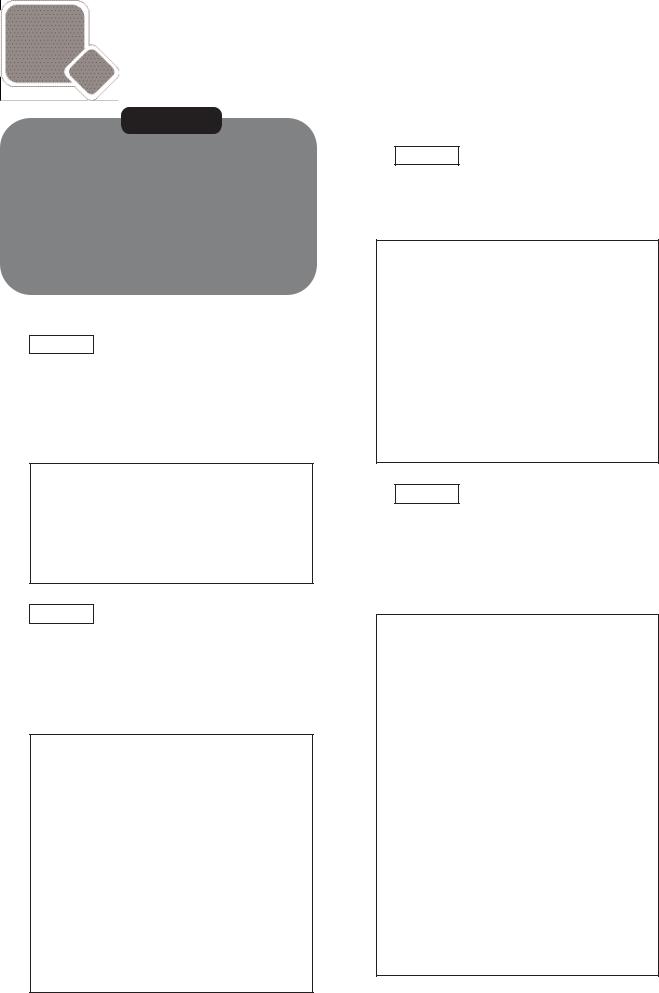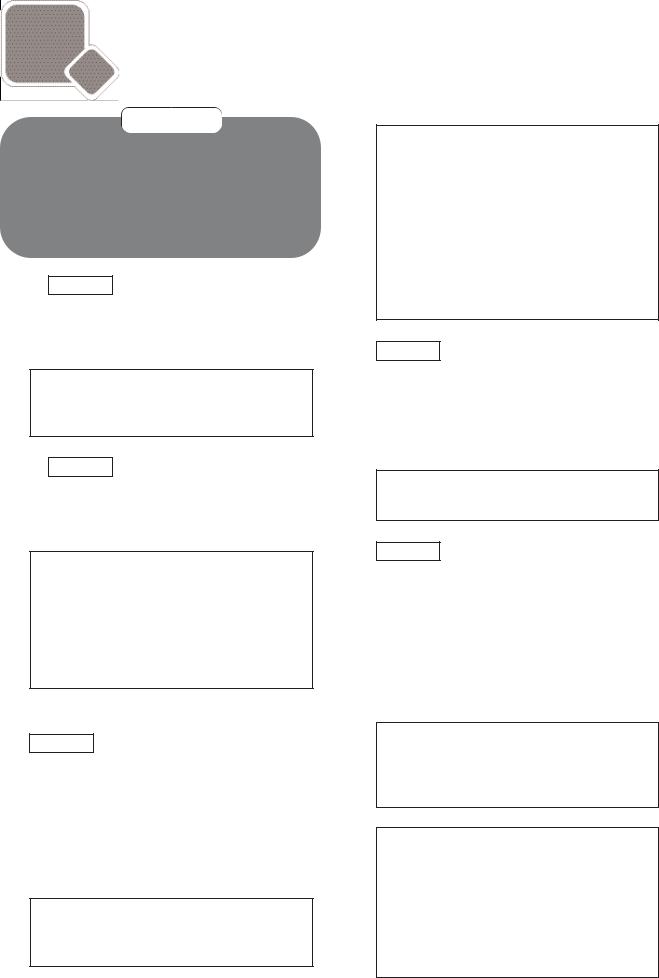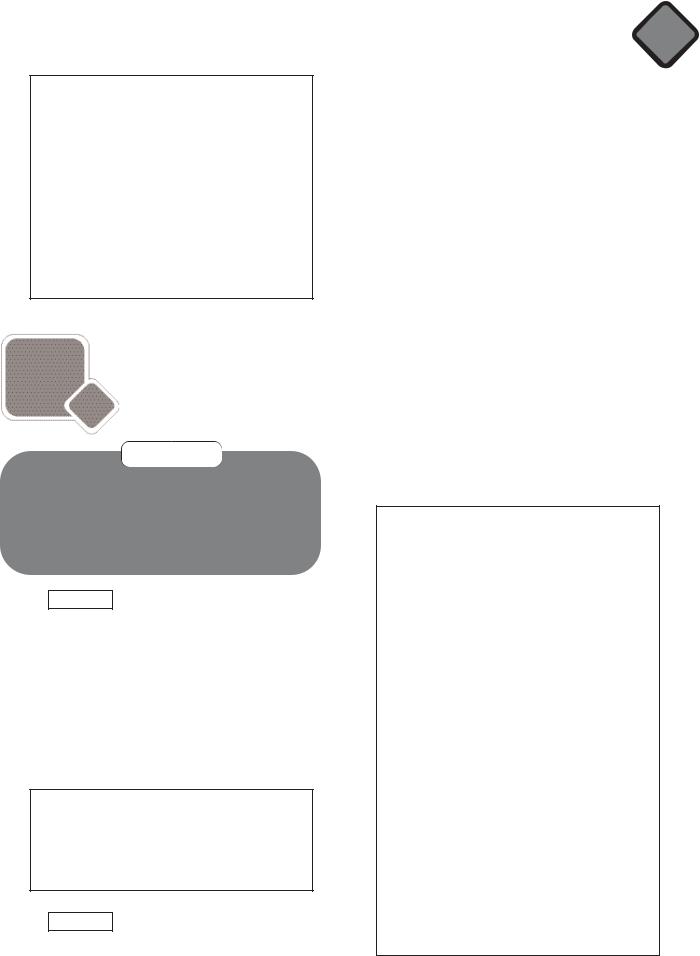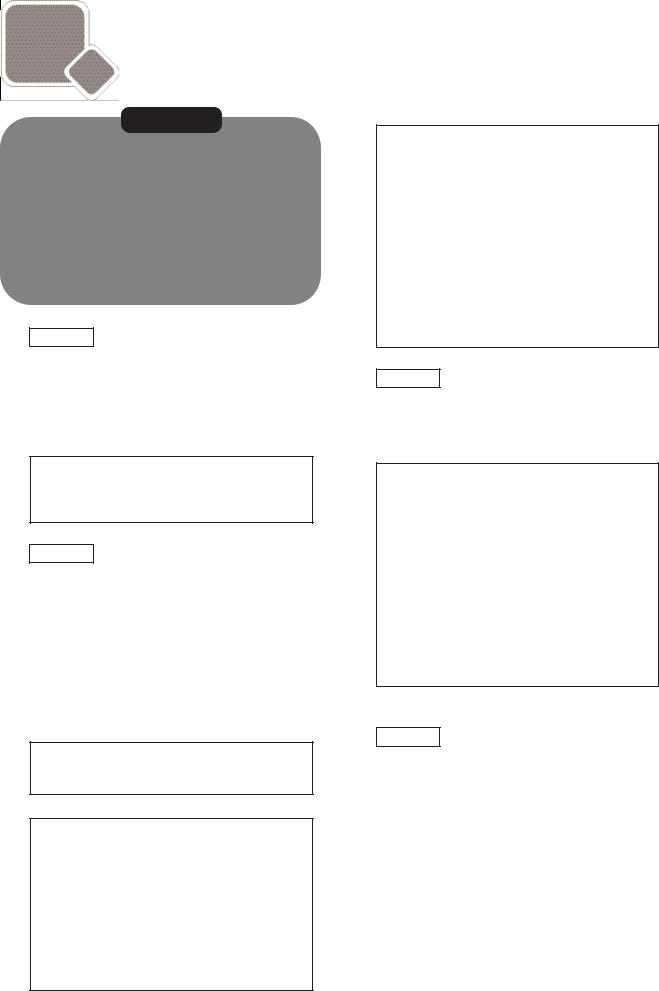
Учебники школьные / анг яз уч ответы
.PDF
Challenges |
Module 8 |
Before you start …
ñWork through the questions with the class, asking follow up questions to encourage Ss to expand on their answers as much as possible. (e.g. Why are people afraid of things? What are some phobias? What healthy habits do you have? What habits do you have that are unhealthy?)
ñMake sure Ss understand this section and use the prompts to recycle vocabulary seen in Module 7.
Look at Module 8
ñRefer Ss to the title of the module, Challenges, and invite them to suggest what they think it means and what they expect to learn from the module.
Suggested Answer Key
The title means the things in our lives that test our strength and abilities. I think we will learn about different challenges that people face in their lives and how they overcome them.
ñAsk Ss to look through the module and find the page numbers for each of the pictures. Ask questions to stimulate a discussion about them.
Suggested Answer Key
Focus Ss’ attention on pic 1 (p. 121).
T: What page is the picture on?
S1: It’s on page 122. It’s a person surfing.
T: What kinds of challenges does a surfer face? S2: They have to use their skills to surf big waves
and swim in wild water.
T: What sport do you find challenging? S3: I think skiing is very challenging.
T:What other types of challenges do we face besides sports?
S4: Sometimes we face problems with our health or with our friends that we have to try and solve.
Pic 2 (p. 125)
What is happening in this picture? Do you think it is dangerous? What dangerous or risky sports do you do or would like to do? Why?
Pic 3 (p. 132)
What is this a picture of? Why would someone do this? What feelings would you feel is you did this?
Pic 4 (p. 135)
What does the picture show? Where was the picture taken? What do you know about this place? Why should we care about such places?
Find the page number(s) for
Allow Ss time to browse through the module and find the items. Ask them to explain what each item is and elicit simple information about each of them.
Suggested Answer Key a text message (p. 127)
Why do we send text massages instead of calling someone? Do you sent text messages? Why?
an application form (p. 130)
What is an application form? (a document that asks for information that you fill out when apply for something such as a job or a membership) What is this form for? What kinds of information does it ask for? Have you ever filled out an application form? What for?
a motto (p. 135)
What is a motto? (a short sentence or phrase that expresses a rule or belief in a particular behaviour or way of acting) Who uses mottos? Why? Do you have a motto or know of one?
Explain that the module has:
―a Culture Corner
―a Going Green section
Ask Ss to look at the relevant pages and elicit what each section is about (Helen Keller, The Challenge of Antarctica The Earth’s Last Green Wilderness).
Listen, read and talk about …/Learn how to …/ Practise …/Write/Give …
Select Ss to read through the list of items that will be covered in the module. If necessary, explain any new vocabulary. Ask Ss to go through the list and tick any items they think they know or can do, put a cross next to the ones they do not know and a star next to the ones they think will be the most useful. Select Ss to report on which items they have ticked or put a star next to.
143

8 a Reading & Vocabulary
Objectives
Vocabulary: parts of the body; injuries; experiences
Reading: reading for confirmation; reading for specific information
Listening: listening for confirmation
Speaking: discussing injuries; conducting an interview
Writing: sentences about challenges
Reading
1Focus Predicting the content of a text/
Reading and listening for confirmation
ñRefer Ss to the pictures and read the introduction to the text.
ñElicit answers to the questions.
ñHave Ss read and listen to the text to find out.
Answer Key
Both of these people have overcome huge challenges. They are both strong people. I would guess that Bethany had a surfing accident and Tom obviously struggles with being in a wheelchair because of a handicap.
2Focus Reading for specific information
(T/F/NS)
ñDirect Ss to read through the statements and underline the key words.
ñHave Ss read the text and complete the task.
ñRead out the answers in class and check.
Answer Key
1F Bethany was planning to turn professional in 2003, but she was attacked by a shark.
2 NS
3 T
4F She thinks about sharks all the time, but she tries to overcome her fears.
5 F She wonders why this happened, but she knows it has made her stronger.
6 NS
7 NS
8F Tom is able to control the camera in different ways.
9 T
Vocabulary
3 a) Focus Understanding new vocabulary
ñRefer Ss to the words/phrases in the rubric. Elicit the meaning of the highlighted words.
ñElicit answers and check.
Answer Key gigantic ― huge plants ― place firmly
keep my mind on ― concentrate on inspiration ― encouragement
quit ― give up
perfectly still ― without moving at all come into sight ― appear
before long ― soon realised ― understood
scaring them off ― frightening them away deal with ― face
b)Focus Practising vocabulary
ñElicit the meaning of the words in bold and discuss.
ñHave Ss write their own sentences.
ñAsk Ss to say their sentences in class and check.
Suggested Answer Key furiously: quickly carefully: with caution
ripping off: to tear off with force motto: a meaningful saying
spine: the bones in your back that hold you upright
brain damage: an injury to the brain
share: to be used between more than two people
strapped: fasten
disability: to be unable to do something physically
bumps: things that slow you down
She carefully removed the glasses from the top shelf.
Tim is ripping off all of the labels from his shirts.
144

Our school motto says to be respectful to one another.
You must protect your spine.
He couldn’t talk because of the brain damage. My sister and I share a computer.
All passengers must be strapped into their seats before take-off.
He was born with a disability and couldn’t walk.
She has overcome many bumps along the way.
4Focus Understanding phrases
ñHave Ss read through the word list and check they understand the words.
ñHave Ss complete the task and check their answers with a partner.
ñHave Ss write sentences using the phrases.
ñAsk Ss to read their sentences in class and check they understand the expressions.
Answer Key |
|
|
|
1 |
face |
6 |
experience |
2 |
win |
7 |
seriously |
3 |
total |
8 |
feel |
4 |
terrifying |
9 |
brain |
5 |
positive |
10 |
survive |
|
|
|
|
Suggested Answer Key
1Bethany Hamilton faces challenges other surfers don’t have in her sport.
2Many people didn’t expect Bethany to win a competition after the accident.
3It’s a total miracle that Bethany is able to surf again.
4 The shark attack was a terrifying experience for Bethany.
5Amazingly, Tom has a positive attitude and considers himself lucky.
6Bethany experienced a disaster, but was determined to overcome it.
7Tome seriously bruised his spine in a car accident.
8Both Bethany and Tom don’t want people to feel sorry for them.
9Tom feels lucky not to have any brain damage from his accident.
10Both Bethany and Tom feel lucky to have survived an accident and be alive.
Reading & Vocabulary 8a
5Focus Finding opposites (antonyms)
words
ñHave Ss complete the task.
ñSs compare answers with a partner.
Answer Key |
|
|
|
Text A |
Text B |
||
1 |
quickly |
1 |
still |
2 |
unusual |
2 |
noisily |
3 |
professional |
3 |
natural |
4 |
depressed |
4 |
up close |
5 |
positive |
|
|
|
|
|
|
6Focus Expanding vocabulary
ñWrite the headings from the rubric on board and have Ss copy them into notebooks.
ñHave Ss search the text for parts of the that are mentioned and write them under appropriate heading.
ñHave Ss brainstorm other words and write under the appropriate heading in notebooks.
ñCheck Ss’ answers on the board.
Answer Key
|
Face |
Body |
|
|
eyes |
feet, arm, spine, |
|
|
|
brain, knee |
|
|
|
|
|
|
|
|
|
|
|
|
|
|
Suggested Answer Key |
|
|
|
|
|
|
|
Face |
Body |
|
|
|
|
|
|
nose, lips, chin, |
legs, waist, back, |
|
|
cheeks, teeth |
hands, shoulders |
|
|
|
|
|
|
|
|
|
7 a) Focus Understanding vocabulary
ñHave Ss complete the task and check dictionary.
ñElicit answers in class to check.
Answer Key |
|
|
|
|
|
2 |
eye |
4 |
ear |
6 |
spine |
3 |
eyebrow |
5 |
teeth |
7 |
tongue |
|
|
|
|
|
|

8a |
|
|
Reading & Vocabulary |
|
|
|
|
|
|
|
|
|
|
||
|
|
|
|
Discussing injuries |
|
|
|
||||||||
|
|
|
|
|
|
|
|
|
|
|
|
|
|
|
|
|
|
|
Focus |
|
|
Interviewer: You are such an inspiration to |
|
||||||||
|
|
ñ In pairs, Ss use the prompts to ask |
each |
many. Tell us what else you are doing besides |
|
||||||||||
|
|
|
other about different injuries. |
|
|
surfing and winning competitions? |
|
|
|||||||
|
|
|
|
|
Bethany: I want to take my experience and |
|
|||||||||
|
|
ñ Monitor the activity and check for correct |
|
||||||||||||
|
|
|
use and understanding of vocabulary. |
|
|
help |
others who face challenges like me. I |
|
|||||||
|
|
|
|
|
went to Thailand after the tsunami disaster to |
|
|||||||||
|
|
|
|
|
|
|
|
|
|||||||
|
|
|
|
|
|
|
|
help the children face their fear of water and |
|
||||||
|
|
Suggested Answer Key |
|
|
|
||||||||||
|
|
|
|
overcome |
the terrifying |
experience of |
the |
|
|||||||
|
|
ñ A: Have you ever burnt your hand? |
|
|
|
||||||||||
|
|
|
|
tsunami. |
|
|
|
|
|
||||||
|
|
|
B: Yes, I have. |
|
|
|
|
|
|
|
|||||
|
|
|
|
|
Interviewer: We all thank |
you Bethany |
for |
|
|||||||
|
|
|
A: How did it happen? |
|
|
|
|||||||||
|
|
|
|
|
showing us what is possible if you never give |
|
|||||||||
|
|
|
B: I was cooking dinner. |
|
|
|
|||||||||
|
|
|
|
|
up. |
|
|
|
|
|
|
|
|||
|
|
ñ A: Have you ever sprained your ankle? |
|
|
|
|
|
|
|
|
|
||||
|
|
|
|
Bethany: My experience has made me a better |
|
||||||||||
|
|
|
B: Yes, I have. |
|
|
|
|||||||||
|
|
|
|
|
person and I am happy it has helped others as |
|
|||||||||
|
|
|
A: How did it happen? |
|
|
|
|||||||||
|
|
|
|
|
well. |
|
|
|
|
|
|
|
|||
|
|
|
B: I tripped on a step. |
|
|
|
|
|
|
|
|
|
|||
|
|
|
|
|
|
|
|
|
|
|
|
|
|||
|
|
ñ A: Have you ever cut your finger? |
|
|
|
|
|
|
|
|
|
|
|||
|
|
|
|
|
|
|
|
|
|
|
|||||
|
|
|
B: Yes, I have. |
|
|
|
|
|
|
|
|
|
|
||
|
|
9 |
Focus |
Writing about challenges |
|
|
|||||||||
|
|
|
A: How did it happen? |
|
|
|
|||||||||
|
|
|
|
|
ñ Read the rubric and check Ss understand the |
||||||||||
|
|
|
B: I was chopping vegetables. |
|
|
||||||||||
|
|
|
|
|
|
|
|
task. |
|
|
|
|
|
||
|
|
|
|
|
|
|
|
|
|
|
|
|
|||
Speaking & Writing |
|
|
ñ Have Ss |
write a few |
sentences about the |
||||||||||
|
|
challenges in their own life. |
|
|
|
||||||||||
|
|
|
|
|
|
|
|
|
|
|
|||||
|
|
|
|
Conducting an interview |
|
|
ñ In pairs, have Ss read their ideas to their |
||||||||
8 |
Focus |
|
|
||||||||||||
|
ñ Read the rubric and example with Ss and check |
partner and discuss. |
|
|
|
|
|||||||||
|
ñ Monitor the activity and assist as necessary. |
||||||||||||||
|
|
they understand the task. |
|
|
|||||||||||
|
|
|
|
|
|
|
|
|
|
|
|
||||
|
ñ In pairs, have Ss conduct an interview of one of |
|
|
|
|
|
|
|
|
||||||
|
Suggested Answer Key |
|
|
|
|
||||||||||
|
|
the characters in the text. |
|
|
|
|
|
|
|||||||
|
|
|
|
People like Bethany and Tom are an inspiration |
|
||||||||||
|
ñ Direct Ss to use the vocabulary they |
have |
|
||||||||||||
|
|
learned in the unit. |
|
|
to me. They face difficult challenges every day |
|
|||||||||
|
|
|
|
and overcome them. They have such positive |
|
||||||||||
|
ñ Monitor the activity and assist as necessary. |
|
|||||||||||||
|
ñ Tell Ss to reverse the roles and repeat |
the |
attitudes. I think I will try to be more positive |
|
|||||||||||
|
|
activity. |
|
|
and |
more |
determined |
to |
overcome |
any |
|
||||
|
|
|
|
challenge I might face in my life. If they can |
|
||||||||||
|
|
|
|
|
|
|
|
|
|||||||
|
|
|
|
|
|
|
|
do it then so can I. |
|
|
|
|
|||
|
|
Suggested Answer Key |
|
|
|
|
|
|
|||||||
|
|
|
|
|
|
|
|
|
|
|
|
||||
|
|
Interviewer: Bethany, it’s a total miracle that |
|
|
|
|
|
|
|
|
|
||||
|
|
you survived the shark attack and are able to |
|
|
|
|
|
|
|
|
|
||||
|
|
surf again. How did you do it? |
|
|
|
|
|
|
|
|
|
|
|||
|
|
Bethany: Well, I just followed my motto: Me |
|
|
|
|
|
|
|
|
|
||||
|
|
quit? Never! and decided to surf again as soon |
|
|
|
|
|
|
|
|
|
||||
|
|
as possible. |
|
|
|
|
|
|
|
|
|
|
|||
|
|
Interviewer: After this terrifying experience |
|
|
|
|
|
|
|
|
|
||||
|
|
you were back surfing in just three weeks. |
|
|
|
|
|
|
|
|
|
||||
|
|
How did you manage that? |
|
|
|
|
|
|
|
|
|
|
|||
|
|
Bethany: It wasn’t easy to go back to the |
|
|
|
|
|
|
|
|
|
||||
|
|
water. First I had to learn to surf all over again |
|
|
|
|
|
|
|
|
|
||||
|
|
and change my technique. The attack is always |
|
|
|
|
|
|
|
|
|
||||
|
|
on my mind, but I try really hard to keep my |
|
|
|
|
|
|
|
|
|
||||
|
|
mind on surfing and having fun. |
|
|
|
|
|
|
|
|
|
|
|||
|
|
|
|
|
|
|
|
|
|
|
|
|
|
|
|
146

8 b Listening & Speaking
Objectives
Reading: reading for confirmation
Listening: listening for confirmation; listening for intonation; listening for gist
Speaking: role playing; seeking approval/ expressing approval and disapproval; talking about doing an extreme sport
1 a) Focus Introducing the topic of the unit
ñRefer Ss to the pictures.
ñElicit answers to the questions in the rubric and discuss.
Suggested Answer Key
The people must be brave. They are all involved in activities that could be dangerous.
b)Focus Describing a risky experience
ñIn pairs, have Ss describe one of the experiences in the pictures.
ñMonitor the activity and assist as necessary.
Suggested Answer Key
2I’m on a roller coaster. I can hear people screaming. I feel scared.
3I’m walking a tightrope. I feel nervous and scared.
4I’m skydiving. I hear the wind blowing through my ears. I’m thrilled and excited.
A:Do you think I should try this new dish?
B:Why not?
A:Do you think it’s a good idea to take up a new hobby?
B:If I were you, I would.
A:Do you think I should get a summer job?
B:I’m not sure that’s a good idea.
A:I’m thinking of learning a foreign language.
B:Sure, go for it!
3Focus Predicting the content of a dialogue
ñRead out the first two exchanges from the dialogue and elicit possible answers to the question in the rubric.
ñHave Ss read and listen to the dialogue to check.
Answer Key
Brian had an accident doing an extreme sport.
4Focus Understanding vocabulary
ñRefer Ss to the highlighted words in the dialogue and elicit their meanings.
ñHave Ss write sentences using the highlighted words.
ñInvite Ss to read their sentences and check.
ñIn pairs, have Ss read the dialogue and exchange roles.
ñMonitor and assist as necessary.
Everyday English
2Focus Role playing/seeking/expressing
approval/disapproval
ñRead through the language box with Ss and check they understand the expressions.
ñIn pairs, have Ss role play the different situations from the rubric. Direct them to use the expressions from the language box.
ñMonitor the exchanges and assist as necessary.
Suggested Answer Key
A:I’m thinking of getting a new haircut.
B:I think it’s a great idea.
Answer Key obviously ― clearly stick to ― stay with
accidentally ― not on purpose
Suggested Answer Key
1She was obviously angry or she wouldn’t have screamed at us.
2You need to stick to your diet if you want to lose weight.
3I didn’t realise and I accidentally locked the door to the house and left the key inside.
147

8b Listening & Speaking
5Focus Role playing a dialogue
ñRead out the rubric and check Ss understand the task.
ñIn pairs, have Ss role play a dialogue using the vocabulary and expressions they have learnt.
ñSs record themselves.
ñAsk some pairs to act out their dialogue for the class.
Suggested Answer Key
A:Amy! How did you get those scratches on your face?
B:Oh, it was silly, really.
A:Tell me what happened.
B:Well, remember I told you I was going skydiving at the weekend.
A:Yes, of course.
B:Well, I was having a brilliant time and everything was going smoothly right up until I was about to land.
A:Oh, dear, what happened?
B:Unfortunately I missed my target and I landed in a tree! I got stuck on a branch and scratched my face.
A:Well, you are lucky that was all that happened.
B:Yes I suppose. Other than that, I really enjoyed it.
Say it right
6Focus Using appropriate responses/
Listening for confirmation
ñHave Ss complete the task.
ñSs listen to the recording and check their answers.
ñPlay the recording again with pauses for Ss to repeat.
Answer Key
1 c |
2 d |
3 b |
4 e |
5 a |
Intonation
7Focus Listening for intonation
ñHave Ss listen to the recording and complete the task.
ñPlay the recording again with pauses for Ss to repeat. Check Ss’ answers.
Answer Key
1A: Where are you from?
B:I’m from Russia.
2A: What do you do?
B:I’m a student.
3A: When did you start ice climbing?
B:I started three years ago.
8Focus Role playing doing an extreme sport/
Practising intonation
ñIn pairs, Ss role play the scenario.
ñDirect Ss to pay attention to their intonation.
ñMonitor the activity and assist as necessary.
Suggested Answer Key
B: I went with my friends Ivan and Tanya.
A:How was it?
B:It was fantastic.
A:Where did you go exactly?
B:We went to Copper Mountain. I can’t wait to go again!
A:Really? When do you plan to go again? Maybe I will come with you?
B:Oh yes! We are going next weekend.
Listening
9Focus Listening for gist (multiple matching)
ñPlay the recording.
ñHave Ss complete the task.
ñHave Ss listen again to the recording and check their answers.
Answer Key
1 E |
2 D |
3 A |
4 B |
5 C |
10 Focus Consolidating vocabulary from the
unit
ñHave Ss think of ten new phrases they have learnt and write sentences with them.
ñIn pairs, Ss read each other their sentences.
ñMonitor the activity and check for correct use of the phrases.
148

Listening & Speaking 8b
8 c Grammar in Use
Objectives
Grammar: direct speech; reported speech; reported questions; reporting verbs; some/any/ every/no + compounds
Speaking: giving /reporting orders / commands Writing: an email using reported speech
1 a) Focus Identifying direct and reported
speech
ñRead the cartoon and the joke with Ss and elicit the answers to the questions.
ñExplain that direct speech is the actual words a person says as in the speech bubbles in the cartoon and that reported speech is the exact meaning of what a person said but not their exact words as in the joke.
Answer Key
Actual words the people said are in the speech callouts in the cartoon. The exact meaning, but not actual words are in the joke box at the side.
b) Focus Understanding direct and
reported speech
ñHave Ss complete the table and elicit answers to the questions in the rubric and discuss.
ñRefer Ss to the Grammar Reference section and review.
Answer Key |
|
1 was shrinking 2 will |
3 would |
1The tenses change into the past form of the particular verb form in the direct speech.
2The pronouns change to refer to the person saying the speech and others in the speech. e.g. Sam said, “You are my friend.” Sam told me that I was his friend.
2said and told. Said is used when the person spoken to is not mentioned.
3 A positive command is reported using to + infinitive verb.
A negative command is reported using not to + infinitive verb.
4 Time Expressions change in reported speech according to the meaning of the sentence.
today that day
yesterday the day before, the previous day tomorrow the next day, the following day next week the week after, the following week
last year the year before, the previous year this that

8c |
|
|
Grammar in Use |
|
|
|
||||
|
|
|
|
Forming direct speech from |
|
|
|
|||
|
|
|
|
|
||||||
2 |
|
Focus |
|
S1: Jane, leave the classroom immediately. |
||||||
|
|
reported |
speech |
|
|
|
|
S2: What did Jerry say? |
||
|
ñ Have Ss complete the task. |
|
|
|
S3: He told you to leave the classroom |
|||||
|
ñ Ask Ss to read out their answers and check. |
|
immediately. |
|||||||
|
|
|
|
|
|
|
|
|
|
|
|
|
|
|
|
|
|
|
|
|
|
|
|
|
Answer Key |
|
|
|
|
|
|
|
|
|
|
|
|
5 |
|
Focus |
Practising reported speech |
||
|
|
|
1 b |
2 a |
3 b |
4 b |
|
|||
|
|
|
|
ñ Have Ss complete the task. |
||||||
|
|
|
|
|
|
|
|
|||
|
|
|
|
|
|
|
|
ñ Invite a S to report the message and check. |
||
3Focus Practising ‘said’ or ‘told’ in
reported speech
ñRead the example in the rubric and elicit why told is used instead of said (told is used because the person spoken to is mentioned: me).
ñSs complete the task and compare with a partner.
ñElicit answers and check.
Answer Key |
|
|
|
|
2 |
told |
4 |
told |
6 said |
3 |
said |
5 |
said |
|
2Jack told me that he had just broken a glass.
3 Jane said not to shout. She had a headache.
4Ryan told us that they were not going to the cinema that night.
5Brain said to Joanne that Tim was working that day.
6I said to Greg that I didn’t know where my MP3 player was.
4Focus Practising reporting orders/ commands
ñIn groups of 3 have Ss give and report orders as in the example.
ñMonitor the activity and check Ss can correctly report the orders.
Suggested Answer Key
S1: No talking in class you two!
S2: What did Maria say?
S3: She told us not to talk in class.
S1: Don’t interrupt me!
S2: What did he say?
S3: He said not to interrupt him.
Answer Key
Tom told me that he couldn’t come to music practice. He said that he was not feeling very well and he was going to the doctor. He said not to worry and that he would be there (here) on Friday.
6 a) Focus Understanding reported
questions
ñRead the table and check Ss understand it.
ñRefer Ss to the Grammar Reference section and review it.
ñElicit answers to the gaps in the theory and discuss the difference between reporting direct whquestions and indirect or yes/no questions (to report wh questions we use the same question word; to report indirect or yes/no questions we use if/whether).
Answer Key |
|
|
1 yes/no |
2 wh- |
3 changed |
b)Focus Practising reporting questions
ñHave Ss complete the task.
ñInvite Ss to report the questions and check.
Answer Key
2The doctor asked when I started feeling sick.
3 The doctor asked if (whether) I felt sick.
4The doctor asked if (whether) I had a sore throat.
5The doctor asked whether (if) I had taken any painkillers.
150

7Focus Practising reported verbs
ñRead the theory box and check Ss understand it.
ñRefer Ss to the Grammar Reference section and review it.
ñHave Ss complete the task.
ñInvite Ss to report the sentences and check.
Answer Key
1She reminded me that my appointment was at 2pm.
2He warned me not to step on that broken glass.
3 Pam offered to lend me her MP3 player.
4Bill explained that he was late because there had been a lot of traffic.
5Mum advised me to put a plaster on my finger.
6 He refused to go to the doctor.
7 Jane promised that she would not be late.
8Focus Understanding some/any/no/every +
compounds
ñReview the Grammar Reference section with Ss.
ñHave Ss complete the task.
ñInvite Ss to read out the sentences in class and check.
Answer Key |
|
|
|
|
|
2 |
nothing |
4 |
nothing |
6 |
something |
3 |
anyone |
5 |
everything |
7 |
No one |
|
|
|
|
|
|
Grammar in Use 8c
Writing
9Focus Writing an email using reported
speech
ñRead the rubric with Ss and check understand the task.
ñDirect Ss to pay attention to the expressions and verb tenses in their speech.
ñAllow Ss time to write their Alternatively, assign the task as HW.
ñInvite Ss to read their emails out and check correct use of reported speech.
ñAs an extension, have Ss rewrite their from Paul in direct speech.
Suggested Answer Key
Hi David!
Guess what! Paul told me that he had accident. He said that he had twisted his while he was playing basketball at school. told me to tell you he was sorry and that would be impossible for him to go camping weekend with us. He promised that as soon he was better we would arrange to go
He wished us a good trip and to be careful the mountains. So it’s just the two of us weekend, but I’m sure we will have fun! John

8 d Vocabulary & Speaking
Objectives
Vocabulary: survival; equipment, treating injuries; idioms related to animals
Grammar: question tags
Reading: reading for comprehension/gist; reading for specific information
Listening: listening for specific information; listening for intonation in question tags Speaking: a short talk; describing an incident that involved an injury
1Focus Predicting the content of a text/
Reading for confirmation
juicy: has liquid inside and usually tastes good creepy-crawlies: insects, bugs
turn up your nose: refuse or reject sth as not good enough
warning: sth that makes you aware of a danger or problem
mudslides: a large amount of dirt that falls down a mountain or hill, usually dangerous steep hillsides: sharp rising side of a hill
do the trick: do what you want it to
reflects: when light, sound or heat hit a object and are sent back to their origin
ñRefer Ss to the title of the text.
ñElicit what Ss think the text is about and write their answers on the board.
ñHave Ss read the text and check.
Suggested Answer Key
I think the text will be about how to survive if you are lost in the jungle.
2Focus Reading for gist/Understanding
vocabulary
ñDirect Ss to read the headings and then search the text for key words related to the headings.
ñHave Ss complete the task and compare answers with a partner.
ñCheck Ss’ answers and ask them to justify them from the text.
ñElicit the meaning of the words in bold and allow Ss time to write down any new vocabulary.
Answer Key
1 E |
2 C |
3 A |
4 F |
5 D |
Suggested Answer Key
shelters: places people stay that protects them from bad weather and danger
stick: a long piece of wood or branch from a tree
part: to make a space by moving things that are grouped together in opposite directions vegetation: plants and trees in a area poisonous: very harmful, causes illness or death
3Focus Discussing information from the text/
Listening and reading for specific information
ñHave Ss listen to and read the text again.
ñAsk various Ss to answer the questions.
Answer Key
The author mentions ‘Lost’ to make the point that it is more difficult to survive in the jungle than shown on TV.
The author mentions insects as some can be dangerous and other can be used for food. The author mentions rain because it rains a lot in the jungle and it can cause problems. The author mentions an aeroplane as a possible way to be rescued from the jungle. The author mentions a broken bottle as one thing that you can use to help be rescued.
Speaking
4Focus Making notes on a text/Giving a talk
ñRead the study skills box and check Ss understand it.
ñRefer Ss to the headings and have them write notes.
ñInvite Ss to give a talk using their notes as a guide.
152
